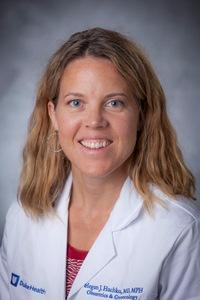
Where did you grow up?
I grew up in the Midwest. My family lived in Kansas City, Chicago and then South Bend, Indiana.
Tell us about your family
I am married to Nick Pearson, who also joined the Duke Global Health Institute as adjunct faculty. He and I met in Nairobi, Kenya, when I was a fellow and he was working for an organization to support social enterprise in East Africa. He became interested in maternal health, and founded a non-profit to provide low-cost maternity care in Nairobi, Jacaranda Health. We have two children, Oliver who is 5, and Linnea, who is 2.
What do you enjoy doing outside of work?
I like to run and hike, and even though I travel a lot for work, I still enjoy exploring new places as a hobby. At home, I try to do a lot of cooking and baking.
What do you specialize in?
My work has focused on global women’s health, health disparities and developing models of care that increase women’s access to services that will address some of these disparities. I have been working in Western Kenya for the past ten years to enhance reproductive health services in HIV-care setting, and provide community-based family planning and cervical cancer screening. Throughout my fellowship, I developed a passion for cervical cancer prevention and colposcopy, and devoted much of my clinical practice to the Dysplasia Clinic at UCSF. I worked with experts in cervical, vaginal and vulvar dysplasia, as well as a multidisciplinary team that addressed vulvar dermatoses. I hope to continue that work here, and am happy to see referrals for patients with Dysplasia or Vulvar Disease.
Where do you practice?
I have clinic in 1J, and work with the Community Outreach and Education division at Duke Regional Hospital.
Is there any specific area related to your profession that you are particularly passionate about? What inspired you to pursue your specialty?
I am really passionate about working with trainees at every level, both in the US and Africa. I enjoy clinical teaching and research mentorship, and consider it one of the best aspects of academic medicine. I am excited to continue that here, and expand my teaching to undergraduates.
What do you enjoy most about Duke?
I really like the sense of community at Duke and the shared commitment to excellence. There is also a palpable sense of idealism and energy from the undergraduates, students and residents.
How long have you been at Duke, or did you come back after training here? What made you come back if that is the case?
I was a Duke undergraduate, so I hold many fond memories of my time here and when we were thinking of leaving San Francisco, was very excited about the opportunity to return. Duke is unique in having a Global Health Institute which allows faculty to have joint appointments in the medical center, so that they can combine their clinical and global health interests. I was also given the opportunity to start a Center for Global Reproductive Health at Duke, which will help align and strengthen work across the university in that area. Since graduating, its been a dream of mine to teach undergraduates at Duke. All of these opportunities made coming back to Duke a very easy decision.
What in particular excites you about treating/managing patients in your specialty? Is there a particular story that’s inspiring?
In my work in Africa and the US, I have encountered so many women who are embarrassed, confused or scared about their reproductive health. I think this is particularly important when women are given a diagnosis of HPV or cervical dysplasia, or if they have vulvar symptoms that impact their ability to have a satisfying sexual relationship. Managing the anxiety and uncertainty is as important as managing the clinical condition. I find that connecting with patients to understand and answer their questions and concerns is one of the most rewarding aspects of my work.